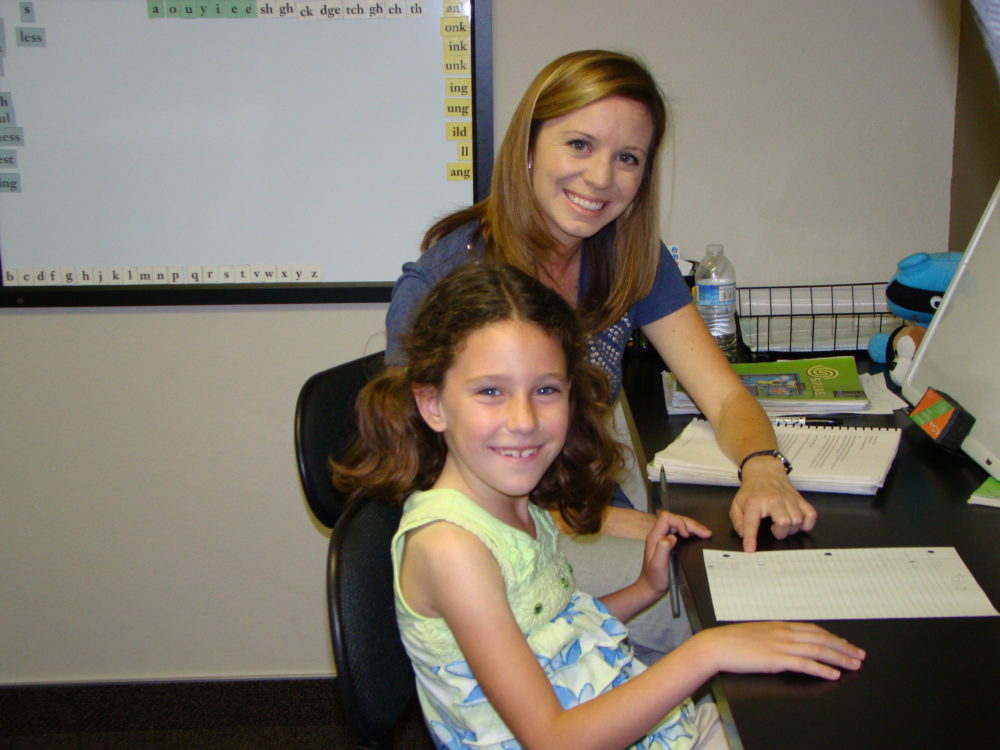
by PRIDE Reading Program Admin | Jan 10, 2013 | Pride San Clemente
Pride Learning Center in San Clemente welcomes a new Director, Lauren Rice.
Mrs. Lauren Rice will be in charge of managing the San Clemente tutoring center, as well as planning and coordinating with state regulations and school district contracts, overseeing the supervision of employees and actively engaging the children and families at the learning center.
Pride Learning Center offers one-on-one tutoring and reading therapy sessions for students with learning disabilities including dyslexia, auditory and visual processing, ADHD, autism and other learning differences. Pride Learning Center offers reading, writing, comprehension and math tutoring programs for students of all ages.
Karina Richland, owner of four additional learning centers states, “We welcome Lauren as the new Director of Pride Learning Center in San Clemente. She comes to us with a strong special education and teaching background” says Richland. “Lauren has such a warm and nurturing personality and the kids and parents just love her, she is truly such a wonderful addition to our Pride family.”
Mrs. Rice has a B.S. in Child and Adolescent Development and an Educational Specialist Credential from California State University, Fullerton. Rice is also certified as a Behavior Intervention Case Manager, specializing in autism spectrum disorders. Her expertise includes reading and math instruction in special education, Orton-Gillingham curriculum development, assessment and differentiated instruction.
“I am so honored, and excited to be the new Director at Pride Learning Center, in San Clemente,” states Mrs. Rice. “All of the people associated with the center have welcomed, and expressed their confidence, and enthusiasm in me. The research based teaching approaches that we use at Pride are among the best, and each child’s reading program is personalized to best fit their needs. We at Pride Learning Center are excited to be a part of the community of San Clemente, and hope to be the key into helping some of our kiddos that struggle in reading.”
Previously, Rice worked as a Special Education instructor for Capistrano Unified School District at Philip Reilly Elementary School.

by PRIDE Reading Program Admin | Sep 21, 2012 | A PRIDE Post, Nutrition
Here are some tips and strategies from Nutrition Guru Melanie Silverman, MS, RD, IBCLC
A few important things to remember when shopping for food for you child:
Fresh food is best.
1. Shop the perimeter of the store. The middle aisles carries mostly processed foods.
2. If you are buying any packaged foods, I strongly advise that you avoid foods that have:
– high fructose corn syrup
– food dyes (FD&C Blue 1, 2 or 3, Red No. 40, Yellow 5 or 6) or artificial colors and artificial flavors
– preservatives (calcium propionate, sodium nitrate, sodium nitrite, sulfites, disodium EDTA)
Tips:
- All lunches should have sources of carbohydrate, protein and fat; 3-4 food items are plenty
- Drinks should be water or milk
- Make sure your child can access the food (provide utensils as needed)
- Watch the SUGAR—read labels
Ideas:(LEFTOVERS)
- Pizzas with spinach and/or mushroom, sliced cucumbers and dip, apple
- Whole wheat or brown rice pasta and sauce, olives, strawberries
- Two hardboiled eggs with crackers, handful of nuts and dried fruit, cantaloupe slices
- Bean and cheese quesadillas, sliced avocado and carrots, apple
- Cold chicken strips and “sauce” for dipping, olive oil chips, watermelon
- Turkey sandwich on whole grain bread with lettuce and cucumber, edamame and pear
- Sliced marinated tofu strips, rice, fruit salad
- Lean roast beef sandwich, red pepper strips, yogurt
- Scoop of tuna, salmon or chicken salad, crackers or pita, carrot sticks, applesauce
- Bagel with butter and/or cheese, green beans, raspberries
- Whole grain cereal, handful of nuts, yogurt
- Roll-Ups (Whole wheat tortilla, turkey, mozzarella cheese, cucumber and avocado), wheat pretzels, banana
- Ham and cheese sandwich, popcorn, celery sticks and dip, oranges
Resources:
- Laptop Lunches: www.laptoplunches.com
- Chef Ann Cooper: www.chefann.com. “Changing the way we feed our children”
- Eating Well: www.eatingwell.com (search “healthy kids lunch recipes and tips)
___________________________________________________________________________________________
Melanie Silverman, MS, RD, IBCLC spent seven years as a clinical dietitian at the University of Chicago Medical Center in the neonatal intensive care unit, pediatric intensive care unit, adult and pediatric bum units, and high risk follow-up clinic. Melanie is a preceptor for various dietetic internship programs around the country and has lectured at state and national meetings for the American Society for Parenteral and Enteral Nutrition, March of Dimes and Prader-Willi California Foundation. Her consulting practice is based in Laguna Beach, California, but she provides nutrition services nationwide. Melanie can be reached at Melanie@feedingphilosophies.com or visit her website at: www.feedingphilosophies.com

by PRIDE Reading Program Admin | Sep 20, 2012 | News & Events
MEET Lauren Katnik, Regional Director
PRIDE Learning Centers is growing rapidly and we are pleased to announce the addition of Lauren Katnik as our new Regional Director for the PRIDE Learning Centers in Los Angeles and Orange County, California.
Lauren Katnik is a graduate of Chapman University with a BA in Elementary Education and Teaching. Lauren has an immense amount of experience teaching literacy and working in elementary education for Irvine Unified School District and Oakland Unified School District. She currently holds a Multiple Subject Teaching Credential and is Orton-Gillingham Certified.
Lauren began her career with PRIDE working in the Mission Viejo Learning Center as the Center Director. As the Regional Director at PRIDE, Lauren manages the day-to-day operations of all four PRIDE Learning Centers. She works with PRIDE instructors to help students achieve their educational goals; conducts student progress meetings with parents and teachers; selects, trains, and manages staff members; and plans and participates in events that increase community awareness.
“I’m very excited to have Lauren join our team,” says Karina Richland, Founder of PRIDE Learning Centers. “Lauren has a proven track record of commended performance and an unwavering commitment to optimizing student and school success. I am just thrilled to add Lauren to our amazing team here at PRIDE.”
Lauren is ready and willing to answer any questions parents, teacher, professionals or community members have. Give her a call at 866-774-3342 ext. 1 or e-mail Lauren@pridelearningcenter.com. Or check out the website at www.pridelearningcenter.com

by PRIDE Reading Program Admin | Jun 13, 2012 | A PRIDE Post, ADHD
The production controls of attention regulate the quality and efficiency of our output – the creations, activities, and behaviors that we produce. They promote good judgment, effective problem solving, and sound decision making. Based on the work of learning specialist, Mel Levine, MD, I will describe four common forms of production control and provide strategies for strengthening these controls at home.
Previewing control enables us to look ahead and foresee an outcome, a likely result of something we’re about to do or attempt.
Options control entails thinking about choices rather than doing the first thing that comes to mind.
Pacing control regulates output speed, so actions are not too fast or too slow.
Quality control involves monitoring quality of output, so improvements can be made. In performing a task or trying to behave in a certain way, it is important to know how we are doing (self-monitoring).
Strategies for Parents:
*To help develop previewing skills, parents can encourage their kids to come up with a plan before writing a report, starting a project, or drawing a picture.
Children need to preview consciously, to visualize and describe what the outcome or result is likely or desired to be.
*It is often helpful to stress previewing in a child’s area of talent. For example, a child who is good at carpentry might be asked to draw a rough sketch of what the final product will look like prior to starting the actual work. Parents should spend time discussing this sketch and helping the child think through possible revisions in advance.
*Kids can be helped with previewing as part of their summer reading. Before reading a book, they should try to preview what its content is going to be based on the book’s title.
*To work on the aspects of options control, parents can ask questions like: “What are the different ways we might do this? What do you think is probably the best way? What would be the worst way to go about this?” This sort of reviewing of alternative strategies can occur before preparing a report or studying for a test. Such techniques can also help with overall problem-solving skills.
*The same kind of help can be related to behavioral and social planning (e.g., “What’s the best thing to do about that girl who called you a bad name in school today? What are some other things you could consider doing? What would work best? Which of these possibilities is a bad idea?”).
*To help children with improper pacing, parents should discourage frenetic work patterns by avoiding statements such as: “You can watch television when you finish your work.” Offers of this kind may inadvertently encourage children to work as quickly and carelessly as possible.
*It can help a child’s pacing to set aside a certain amount of time each evening (or each weekday evening) for cognitive work. The whole family should be engaged in such activities. There is then no incentive to finish quickly, since it will only mean having to find some other brainwork to do.
*Kids who need specific help with self-monitoring and proofreading (quality control) can benefit from looking for discrepancies or errors in their work or in the work of others. They should be required to proofread their own work but only after an interval of hours or days has passed since the work was completed. It is very tedious for anyone to correct something immediately after completing it.
________________________________________________________________________________________________
Dr. Susan E. Cozolino is a Licensed Clinical Psychologist who has a private practice in Beverly Hills. She specializes in the assessment of Attention-Deficit Hyperactivity Disorder and Learning Disabilities in students ages 6 & up. Dr. Cozolino helps students understand and address learning challenges by conducting thorough assessments, creating individualized learning plans, and recommending and advocating for educational services, modifications and accommodations. Dr. Cozolino is also an Adjunct Professor at Pepperdine University Graduate School of Education and Psychology.

by PRIDE Reading Program Admin | Apr 26, 2012 | A PRIDE Post, Summer Programs
As the school year ends, many students are busy during the summer months with camps, play dates, recreational activities and vacations. Some students might even be bored during the long summer months. When summer ends, students go back to school and often forget much of what they learned the previous year. This is what we call the summer learning loss.
Studies show that summer loss for all students equals about a month of academic learning. For students with learning disabilities, this loss may amount to as much as 3 months! Weaknesses in memory, processing speed, attention and language cause valuable skills to weaken rapidly. As a result, students will have to spend more time reviewing at the beginning of each school year in order to catch up.
Continuing instruction during the summer months can help greatly reduce learning loss as well as gives students the opportunities to dedicate more time than is possible during the school year to remediate and get ahead. Students can make amazing progress during these long summer months!
Pride Learning Center offers Reading and Writing Summer Programs for students of all ages. We offer an intensive Orton-Gillingham reading and writing program (3 hours M-F), as well as standard sessions (1 hour once or twice a week) between June and August.
Summer Catch – Up Program
Do in 4 weeks what would normally take 30-40 weeks!
Our Pride Intensive offers the most dramatic results. Our reading specialists will provide the needed support to get students at grade level during the long summer months. Your child still gets a summer break, as sessions are typically only 3 hours a day five days a week depending on family choice and goals established at the initial consultation. There are still plenty of hours in the day to play, go to the beach or just relax.
Sample Daily Schedule:
9:00 – 10:00 Orton-Gillingham Reading Instruction
10:00 – 10:30 Technology Based Reading Instruction
10:30 – 11:00 Snack, Fun and Movement
11:00 – 11:30 Writing Instruction
11:30 – 12:00 Orton-Gillingham reading Instruction
Summer Get-Ahead Program
Summer is such a great time to review material and get ahead on next year’s curriculum! We offer programs in reading, writing, spelling and comprehension for those students who want to attend Pride once or twice a week.
Reading Readiness at Pride Learning Center
Pre-K – Kindergarten
Pride’s early intervention program will teach your child to read and get ahead in school. By working through our multisensory, Orton-Gillingham reading program step-by-step, your child will learn alphabetic knowledge and understanding of the alphabetic principles in a fun yet structured environment. Your child will receive a strong and solid reading foundation that will last a lifetime.
Reading and Spelling at Pride Learning Center
Grade K – Grade 8
Pride’s multisensory, Orton-Gillingham reading and spelling program is action oriented and involves constant interaction between our Reading Specialists and your child. Each student at Pride learns to read in a systematic, cumulative, structured and step-by-step process. Each lesson encompasses the skills of decoding, encoding, fluency and reading comprehension. Your child will become a strong and independent reader.
Reading Comprehension
Grade 2 – Grade 12
Pride’s highly successful research-based Reading Comprehension Program teaches students to draw meaning from text and to verbally express their understanding of it. Utilizing nonfiction-reading passages on a variety of subjects, the skills that are taught prepare students for standardized tests and provide valuable practice in nonfiction reading knowledge on a wide range of subjects.
Writing Skills
Grade 2 – Grade 12
Pride’s writing skills program effectively teaches essential skills in careful order: from parts of speech, to sentence structure, to paragraphs, to complete essays. For the reluctant beginning writer, our program provides the essential foundation in thinking and writing skills. For the more proficient and advanced writer, it offers opportunities, strategies, and techniques to apply them.
___________________________________________________________________________________________________
Pride Learning Center has locations in Los Angeles, Redondo Beach, Newport Beach and Mission Viejo. For more information visit www.pridelearningcenter.com or call 866-774-3342 ext. 1





